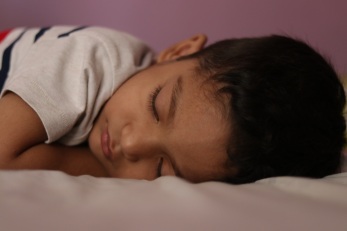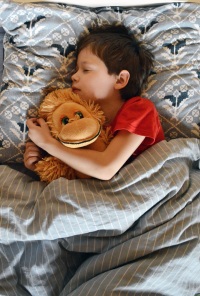 Sleep is always a popular topic in early childhood. Adults often talk about being short on it, and parents often struggle to help their children rest at night. Research routinely shows that children do not receive enough sleep, sometimes by as much as a couple of hours per night. Sleep deprivation is linked to a number of issues in children, including a greater risk for obesity, impaired memory and attention, susceptibility to illness, and poor academic performance. Experts recommend that children ages 0 to 5 sleep 10-16 hours a day, including naps. How can we best support children in developing and maintaining good sleep habits? Below are five habits to help you set the stage.
Sleep is always a popular topic in early childhood. Adults often talk about being short on it, and parents often struggle to help their children rest at night. Research routinely shows that children do not receive enough sleep, sometimes by as much as a couple of hours per night. Sleep deprivation is linked to a number of issues in children, including a greater risk for obesity, impaired memory and attention, susceptibility to illness, and poor academic performance. Experts recommend that children ages 0 to 5 sleep 10-16 hours a day, including naps. How can we best support children in developing and maintaining good sleep habits? Below are five habits to help you set the stage.
- Develop a consistent, calming bedtime routine and follow it every day. Choose a reasonable bedtime and schedule routines leading up to that time, such as having a small snack and/or taking a bath, brushing teeth, reading a story, and finally, tucking into bed. Keep timing concise. Limit the routine to about a half hour. Use a picture planner that depicts each step of your routine if your child is especially sensitive to transitions.
 Address fears and calm anxieties. As children get older, the things they imagine become more elaborate and fears become very real. Allow your child to drift off to sleep with a nightlight (use the dimmest setting). Honor any requests to check under the bed or in the closet. Separation anxiety may also be a concern for your child. Reassure her that you will always be nearby. Pat your child to sleep until you hear her breathing change, and then gradually lift your hand. Or, offer a stuffed animal or favorite blanket for snuggling.
Address fears and calm anxieties. As children get older, the things they imagine become more elaborate and fears become very real. Allow your child to drift off to sleep with a nightlight (use the dimmest setting). Honor any requests to check under the bed or in the closet. Separation anxiety may also be a concern for your child. Reassure her that you will always be nearby. Pat your child to sleep until you hear her breathing change, and then gradually lift your hand. Or, offer a stuffed animal or favorite blanket for snuggling.- Avoid “sleep stealers.” The National Sleep Foundation (NSF) explains that caffeine, television, irregular routines, and intense activity to close to bedtime often make it difficult to obtain quality, restful sleep. Similarly, be sure that all toys, puzzles, and games are put away, especially in your child’s room. Some families find it helpful to cover items with silks or fabric as a way of saying “goodnight” to toys until tomorrow.
- Limit technology before bed. According to the NSF, “For every hour spent using a tablet device, infants and toddlers get 15.6 minutes less sleep, and older kids miss out on an average of 26.4 minutes of sleep nightly.” Added up over time, technology can significantly impact the longevity and quality of children’s sleep.
- Pay attention to how your child sleeps. Like adults, young children can suffer from restless legs syndrome, night terrors, sleepwalking, insomnia, snoring, and sleep apnea. Pay attention to symptoms that may indicate sleep-related disorders, and consult your child’s doctor about anything questionable.
Sleep challenges may come and go as your child passes through various developmental milestones, and sleep behaviors will likely change as she grows. Adjust bedtime routines as needed, but maintain the basics of a calming course of activities leading up to your child ultimately drifting off to sleep independently. If your child sleeps soundly through the night, you have a far better chance of doing the same yourself. Quality sleep is important for the entire family!
You can find additional information on children’s sleep by visiting:
Back to blog listing